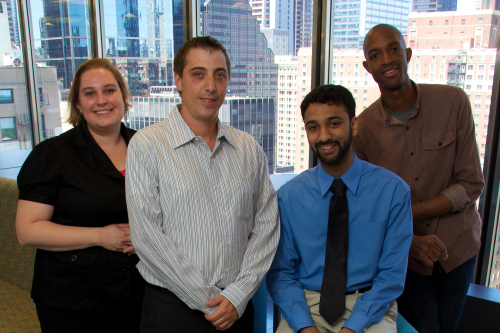Jun 07, 2012
DePaul Student Team Meets Nobel Laureate's Challenge to Create Plan for Sustainable Social Business in Haiti
DePaul Student Team Meets Nobel Laureate's Challenge to Create Plan for Sustainable Social Business in Haiti
A DePaul University student team’s business plan for an aquaponics and composting farm in Haiti was chosen winner of a social venture business competition that arose from a challenge from Nobel Peace Prize winner Muhammad Yunus.
Bella Terra’s plan was chosen from among seven finalists who presented their business proposals before a panel of internationally renowned judges. The Bella Terra team consists of DePaul Driehaus College of Business graduate Frank Procaccio, College of Business students Omar Farooq and Nickolas Johnson, and Spertus Institute graduate student Marly Schott.
“We are all extremely proud of our accomplishment and a little shocked at winning, because all of the ideas were so good,” said Procaccio. “To know that our idea was validated by a distinct and diverse group of judges from among an equally exciting group of ideas feels really good.”
Bella Terra’s plan calls for using aquaponics, a system of agri/aquaculture that utilizes the symbiotic relationship between fish and plants to create a closed-loop method of farming. The business would grow and harvest tilapia and produce crops. The nitrogen, ammonia and carbon dioxide naturally excreted by fish would be used to fertilize the crops, thus creating a symbiotic relationship. After the plants remove the nutrients from the water, the water would be cleaned, re-oxygenated and returned to the fish tank.
Bella Terra’s plan also includes a composting and permaculture operation and an educational component in which the business would work with local farmers to teach them about aquaponics and composting as well as how to gain selling power by working together as a collective.
“Initially we began this because we cared about helping people and we wanted to use our creativity and intellect to try to resolve some of the issues the competition was attempting to address,” Procaccio said. “We all knew things were difficult in Haiti, but as you research and you really realize how challenging it is there, you become more committed to trying to help.”
Participants in the competition were asked to design a replicable model of a social business that creates at least 10 jobs for individuals living in poverty in Haiti. The jobs would provide workers with sufficient pay to support their families and pay for their children’s grade school education and beyond.
The competition’s coordinator, Professor Laura Hartman, said of the team’s plan, “Alleviating poverty is an objective that is more likely achieved through partnerships—Haitians recognize that the solutions are not based in solitary action. Bella Terra recognized this as well. Bella Terra’s proposal demonstrates the appropriate balance between partnering and becoming self-sufficient as a people.
“The consideration that Bella Terra offered to the long-term implications of their proposal to both Haiti’s employment structure and its environmental and food security landscape—i.e. a threefold impact—was one of the components that most impressed me with their plan,” said Hartman, who is research director for DePaul’s Institute for Business and Professional Ethics and special assistant to the president for Haiti initiatives.
The idea for the competition arose from a challenge that Yunus made during a visit to DePaul in September 2011. Yunus is founder of the Grameen Bank in Bangladesh, the microfinancing pioneer that gives low-cost loans to businesses in developing areas.
“If you have the ideas, we’ll find the money,” said Yunus at the time. Yunus and his Grameen Creative Lab pledged $10,000 to put the winning business plan into action. David Stephens, technical advisory board member of the Grameen Foundation and Yunus’ special advisor, was one of the judges in the competition.
“Many times these competitions bring business plans that really look at the social problem from a bird’s-eye view,” Stephens said. “What Prof. Yunus says is needed is to look at the problem from a worm’s-eye view. Bella Terra did the best job of looking at the problem from the worm’s-eye view.”
Stephens said most of the submitted plans met Yunus’ challenge. “We were very impressed with the focus and dedication of all the teams. We want to follow all of them over at least the next 10 years because we believe that all of them will have a great impact on ending poverty,” he said.
“Prof. Yunus believes that we can put poverty in a museum where you will have to go to remind your children what poverty was like,” Stephens said. “We can do this in our lifetime; it is already happening. People come out of poverty one person, one family at a time. Not by gift but by teaching self-reliance and providing access to capital.”
###
About DePaul
With more than 25,000 students, DePaul University is the largest Catholic university in the United States and the largest private, non-profit university in the Midwest. The university offers approximately 275 graduate and undergraduate programs of study on three Chicago and three suburban campuses. Founded in 1898, DePaul remains committed to providing a quality education through personal attention to students from a wide range of backgrounds. For more information, visit depaul.edu.

Marly Schott, Frank Procaccio, Omar Farooq, Nickolas Johnson
